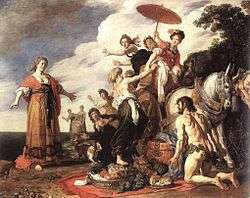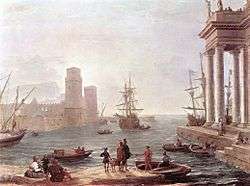Scheria
Scheria (/ˈskɛriə/; Ancient Greek: Σχερίη or Σχερία)—also known as Scherie or Phaeacia—was a region in Greek mythology, first mentioned in Homer's Odyssey as the home of the Phaeacians and the last destination of Odysseus in his 10-year journey before returning home to Ithaca.
From Ogygia to Scheria

Before leaving Ogygia, Odysseus builds a raft and sails eastwards, instructed by Calypso to navigate using the stars as a celestial reference point.[1] On the eighteenth day appear the shadowy mountains of the land of the Phaeacians, that looked like a shield in the misty deep. But Poseidon spots his raft and seeking vengeance for his son Polyphemus who was blinded by Odysseus, produces a storm that torments Odysseus. After three days of struggle with the waves, he is finally washed up on Scheria.
Odysseus meets Nausicaa
Meanwhile, the goddess Athena, who sneaks into the palace, disguises herself as a sea-captain's daughter and instructs princess Nausicaa, the daughter of King Alkinoös in her sleep to go to the seashore to wash her clothes. The next morning, Nausicaa and her maids go to the seashore, and, after washing the clothes, they start to play a game on the beach, with laughs, giggles and shouts. Odysseus, who was exhausted from his adventure and was sleeping nearby, is awakened by the shouts. He covers his nakedness with thick leaves and goes to ask for help from the team. Upon seeing the unkempt Odysseus in this state, the maids run away, but, Nausicaa, encouraged by Athena, stands her ground and talks to him. To excuse the maids, she admits that the Phaeacians are "the farthermost of men, and no other mortals are conversant with them",[2] so they run away since they have never seen a stranger before. Nausicaa, being hospitable, provides clothes, food and drink to Odysseus, then she directs him to the palace of King Alcinous.
The palace of King Alcinous


Following Nausicaa's orders, Odysseus sought to enter the palace of King Alcinous and plead for mercy from the queen, Arete , so he could marry her daughter. On his way to the palace, Odysseus meets Athena disguised as a local girl. In her disguised state, Athena advises him about how to enter the palace. Athena, knowledgeable that the Phaeacians were hostile towards men from the outlands, cloaked Odysseus in a mist that hid him from the Phaeacians' gaze.[3] Under Athena's protection, Odysseus passes through all of the protection systems of the palace and enters the chamber of King Alcinous. Odysseus throws his arms around the queen's legs and supplicates her. Naturally, Alcinous and his court are surprised to see a stranger walking into their secured palace. It was only after Echeneus, a Phaeacian elder, urged King Alcinous to welcome the stranger that they offered Odysseus hospitality
The front doors of the palace are flanked with two dogs made of silver and gold, constructed by Hephaestus. The walls of the palace are made of bronze that "shines like the sun" and is secured with gates made of gold. Within the walls, there is a magnificent garden with apple, pear, and pomegranate trees that grow year-round. The palace is even equipped with a lighting system comprising golden statues of young men bearing torches.
After Odysseus tells Alcinous and his court the story of his adventures after the Trojan War, the Phaeacians take him to Ithaca on one of their ships.
The Phaeacian ships
The Phaeacians possessed remarkable ships. They were quite different from the penteconters, the ships used during the Trojan War, and they were steered by thought. King Alcinous says that Phaeacians carried Rhadamanthus to Euboea, "which is the furthest of any place" and came back on the same day.[4] He also explains to Odysseus what sort of information the Phaeacian ships require in order to take him home to Ithaca.[5]
Tell me also your country, nation, and city, that our ships may shape their purpose accordingly and take you there. For the Phaeacians have no pilots; their vessels have no rudders as those of other nations have, but the ships themselves understand what it is that we are thinking about and want; they know all the cities and countries in the whole world, and can traverse the sea just as well even when it is covered with mist and cloud, so that there is no danger of being wrecked or coming to any harm.
Homer describes the Phaeacian ships as fast as a falcon and gives a vivid description of the ship's departure.
The ship bounded forward on her way as a four in hand chariot flies over the course when the horses feel the whip. Her prow curvetted as it were the neck of a stallion, and a great wave of dark blue water seethed in her wake. She held steadily on her course, and even a falcon, swiftest of all birds, could not have kept pace with her.[6]
Geographical location of Scheria
Many ancient and modern interpreters favour identification of Scheria with the island of Corfu, which is within 110 km (68 miles) of Ithaca. Thucydides, in his Peloponnesian War, identifies Scheria as Corfu/Corcyra. In I.25.4, he records the Corinthians' resentment of the Corcyraeans, who "could not repress a pride in the high naval position of an island whose nautical renown dated from the days of its old inhabitants, the Phaeacians." Locals on Corfu had long claimed this, based on the rock outside Corfu harbour, which is supposedly the ship that carried Odysseus back to Ithaca, but was turned to stone by Poseidon, to punish the Phaiakians for helping his enemy:
with one blow from the flat of his hand turned her [the ship] into stone and rooted her to the sea bottom[6]
The Phaeacians did not participate in the Trojan War. The Greek name Φαίακες is derived from phaios (φαιός)[7] meaning gray. The Phaeacians in the Odyssey did not know Odysseus (although they knew of him, as evidenced by the tales of Demodocus), so they called him a "stranger". Odysseus however was the king of the majority of the Ionian Islands,[8] not only of Ithaca, but also "of Cephallenia, Neritum, Crocylea, Aegilips, Same and Zacynthus"[9] so if Scheria was Corfu, it would be surprising that the citizens of one of the Ionian Islands did not know Odysseus. Furthermore, when Odysseus reveals his identity, he says to the nobles: "... if I outlive this time of sorrow, I may be counted as your friend, though I live so far away from all of you"[10] indicating that Scheria was far away from Ithaca. Many characteristics of the Phaeacians, including their seafaring and relaxed lifestyle are suggestive of Minoan Crete. Aside from the seafaring prowess, the palace walls that shone like the Sun are read to be covered not by bronze but orichalcum. The latter similarities make Scheria also suggestive of Atlantis. Helena Blavatsky proposed in her Secret Doctrine (1888) that it was Homer before Plato who first wrote of Atlantis.[11] From the ancient times, some scholars having examined the work and the geography of Homer have suggested that Scheria was located in the Atlantic Ocean. Among them were Strabo and Plutarch.
Geographical account by Strabo
Approximately eight centuries after Homer, Strabo, the geographer criticized Polybius on the geography of the Odyssey. Strabo proposed that Scheria and Ogygia were located in the middle of the Atlantic Ocean.
At another instance he (Polybius) suppresses statements. For Homer says also "Now after the ship had left the river-stream of Oceanus"[12] and "In the island of Ogygia, where is the navel of the sea,"[13] where the daughter of Atlas lives; and again, regarding the Phaeacians, "Far apart we live in the wash of the waves, the farthermost of men, and no other mortals are conversant with us."[2] All these (incidents) clearly suggest that he (Homer) composed them to take place in the Atlantic Ocean.[14] (Strabo, 1.2.18)
Notes
- ↑ Homer, Odyssey, 5, 270
- 1 2 Homer, Odyssey, 6.204
- ↑ Lattimore, Richard (1967). Homer's The Odyssey, Book 6, Line 160. New York, NY: Harper & Row Publishers, Inc. p. 112. ISBN 0-06-093195-7.
- ↑ Homer, Odyssey, 7.320
- ↑ Homer, Odyssey, Book VIII 555-563
- 1 2 Odyssey, Book XIII 84-88
- ↑ Entry: φαιός at Liddell & Scott, A Greek-English Lexicon.
- ↑ Map of Ionian Islands
- ↑ Iliad, Book II
- ↑ Odyssey, Book IX, 17
- ↑ "It was not he [Plato] who invented it [the story of Atlantis], since Homer, who preceded him by many centuries, also speaks of the Atlantes and of their island in his Odyssey." Secret Doctrine, vol 2. pt3, ch6.
- ↑ Odyssey, XII, 1
- ↑ Odyssey, I, 50
- ↑ The original text of this passage by Strabo is ταῦτα γὰρ πάντα φανερῶς ἐν τῷ Ἀτλαντικῷ πελάγει πλαττόμενα δηλοῦται.
External links
- Odyssey by Homer
- Homer's Odyssey resources on the Web
- Strabo: The Geography
- Atlantis, Poseidonis, Ogygia and Scheria (on page 8)